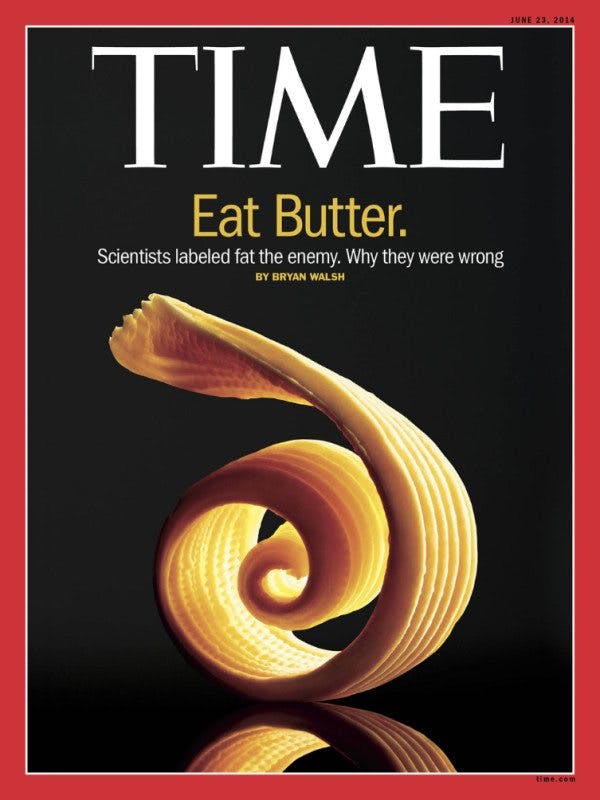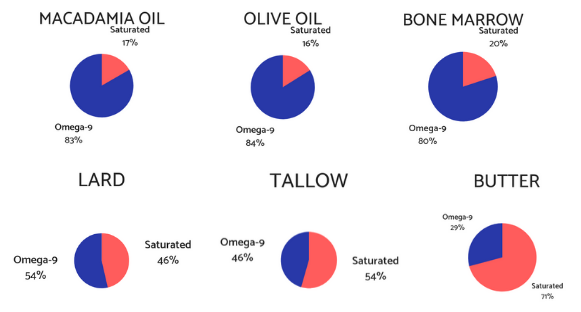Alright, before you freak out: I’m still eating a carnivore diet. And I’m still consuming large amounts of saturated fat every single day.
This blog post is not against saturated fat – not at all.
In fact, you need saturated fats as a source of safe calories, as building blocks for your cells, your hormones, and much more. Saturated fats are good and healthy.
Even mainstream media has caught up in the last few years and now the message is “Eat more butter!”

And by now everyone in the health community knows what a “Bulletproof Coffee” is. In case you have been living under a rock: It’s black coffee with butter and coconut oil or MCT oils which are extracted from coconut oil.
We’re really living in the “Butter Era” at the moment.
But as with almost every substance in nature saturated fat doesn’t just have a light side, but also a dark side.
Unfortunately, this topic isn’t really covered in a satisfying way in current health debates. Instead, in most debates, both sides just call each other ignorant and nothing really gets accomplished.
On one side you have the high-carb advocates who say that saturated fats are unhealthy, while the low-carbers on the other side claim that saturated fats are the greatest thing since – well, I can’t really say “sliced bread” when referring to low-carb people. But you get my point.
Most of the time when low-carb advocates get confronted with claims that saturated fats have been shown in medical studies to exhibit negative health effects they just brush it off and say that the studies are biased and, therefore, wrong.
But is it really that easy?
As with so many things in life, the truth lies in the middle of the spectrum once more. So why did so many scientists back in the days tell us to stay away from saturated fatty acids?
There are several reasons for this:
- The studies were part of the pro-vegetable oil and margarine propaganda. Vegetable oils are incredibly cheap to produce and store. And since the industry isn’t primarily interested in our health but in making lots of money, they pushed the demonization of saturated fat in order to market their margarine.
- Scientists studied saturated fatty acids in conjunction with carbs, which activates the Randle Cycle. When the Randle Cycle gets activated, saturated fats can indeed become unhealthy. But so do all other fats when you combine them with carbs, especially sugar.
- Saturated fatty acids can indeed become harmful to the body. Saturated fatty acids do pose a real health risk under certain circumstances.
Believe it or not but it’s actually true. The consumption of saturated fatty acids can actually harm your body, even if you eat a low-carb high-fat diet and stay away from the sugar-fat combination that activates the Randle Cycle.
But how is that possible?
Let’s take a closer look at point no. 3:
The most abundant saturated fatty acid in our food is palmitic acid. It’s primarily found in butter, but also other animal fats, such as beef tallow and lard.
Here are some studies on the detrimental effects of palmitic acid:
- Palmitic acid causes insulin resistance in the cells. [1, 2, 3, 4, 5, 6]
- Palmitic acid destroys insulin-producing beta-cells in the pancreas. [7]
- Palmitic acid promotes inflammation. [8, 9]
- Palmitic acid increases the risk of atherosclerosis and heart disease. [10, 11]
- Palmitic acid negatively affects the production of mitochondria (energy powerhouses inside our cells). [12]
- Palmitic acid has the lowest rate of being oxidized in the mitochondria. [13]
A lot of those points also apply to other saturated fatty acids like the ones found in coconut oil.
So, I don’t know about you. But to me, this doesn’t really sound like saturated fatty acids are a healthy thing to eat, right?
But don’t fret! There is good news!
All of those aforementioned negative effects get suppressed and even reversed by the presence of Omega-9 MUFAs, such as oleic acid. [2, 4, 7, 11, 14, 15, 16]
Oleic acid is mainly found in olive oil, macadamia oil, and bone marrow. But oleic acid is also found in large amounts in lard and beef tallow.
This explains why people who eat lard and tallow on a low-carb high-fat diet enjoy perfect health despite consuming lots of palmitic acid. Saturated fats are not problematic in the presence of monounsaturated fatty acids (MUFAs) like the Omega-9 oleic acid.
Now we can understand why those studies showed negative health effects of saturated fatty acid consumption: they were using extracted fatty acids in their purified form.
In nature, however, there is no such thing as a pure fatty acid. All naturally occurring fats are always a composition of many different fatty acids.
Let’s take a look at the fatty acid ratio of some fats.
Note: This is NOT the Omega-3 to Omega-6 ratio. We’re talking about a completely different topic here: The ratio of saturated fatty acids to Omega-9 MUFAs.

As you can see macadamia oil, olive oil, and bone marrow have an amazing fatty acid ratio. And it makes perfect sense that we are adapted to large amounts of Omega-9 fatty acids.
When you look at wild game you will notice that the animals have an incredibly low body fat percentage of around 4%. So where did our ancestors get their fat from if all the animals are so lean? The answer is bone marrow and brain tissue. As a species, we are perfectly adapted to this ratio of fatty acids.
Lard and tallow have an almost 50/50 ratio which is also within the optimal spectrum. They are my personal favorite fat sources.
However, when we look at butter we can see that there are far more saturated fatty acids than Omega-9 fatty acids. This is why I think that butter isn’t optimal.
Don’t get me wrong. I still love butter and have it almost daily. But I don’t eat nearly as much butter as I eat lard or tallow.
Bottom line:
You can enjoy a bit of butter and coconut oil here and there but don’t make them your primary fat source. This spot should be reserved for lard, tallow, and bone marrow.
Olive and macadamia oil are also great choices if you prefer fat sources from plants. I personally feel best with animal fats, though.
So instead of coffee with butter, I much prefer bone broth with tallow or lard.
Pingback: 3 REASONS WHY THE CARNIVORE DIET IS BETTER THAN THE KETOGENIC DIET – momagnon.com
Interesting! I feel in fact better with bone marrow and beef fat instead of too much butter. I love butter, but it is in a weird way addicting to me, and not as satisfying as the other two fats. I have the feeling it might create a little inflammation in my body too because of dairy issue. Happy to read this, it fits with my own N.1.
When I haven’t consumed any dairy for a while and then eat butter or other dairy products again I can also feel a little immune response (my tonsils feel a bit sore a few minutes afterward).
thanks for the article, very informative.👏👏👏
thanks for the article, very informative. I can’t do it on a carnivor diet, the weight doesn’t go away and the stomach growls. on keto, I’ve already got up this weight for almost 2 years. I weigh 65 kg. height 168 cm.
So if do I mix Butter and Olive Oil creating a 1:1 ratio I won’t have any issue?
You can just eat animal fat which already has the optimal ratio. And you don’t have to mix those fats for every meal you consume. Just eat butter on its own. As long as you don’t go overboard (e.g. drinking Dave Asprey’s Bulletproof butter coffee) or eating tons of butter sticks like Jimmy Moore then you have nothing to worry about.
Hello, thanks for the article, very good information. I have a question, do you recommend those vegetable oils for cooking? Shouldn’t we be careful with olive oil because it is estrogenic? These are things I wonder…
I don’t recommend vegetable oils for cooking. Industrial seed oils should never be consumed. Don’t be afraid of a bit of estrogenic activity from olive oil. Milk also has a weak estrogenic activity. Those are no problem. The real problem makers with estrogenic activity are xenoestrogens from plastics and other toxins.
Thanks for your answer
Möchte mich herzlichst bedanken für dieses gratis zur Verfügung gestellte große Wissen. Welche Form von hohen Mengen Eiweiß am morgen hat die Frau gegessen, die dann endlich abgenommen hat nach ihrer Leptinresistenz? Mir geht es auch so. Danke und alles Liebe, Monika